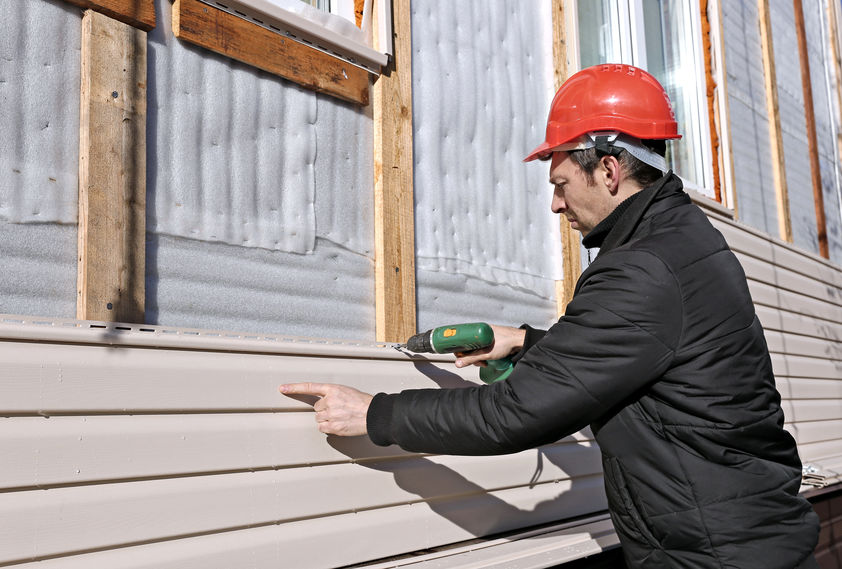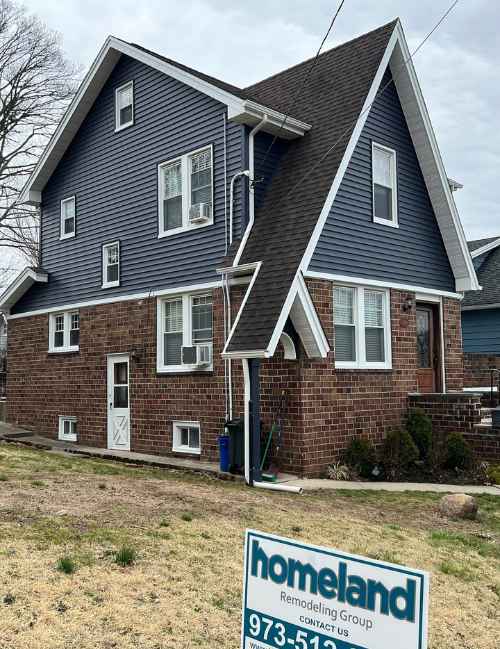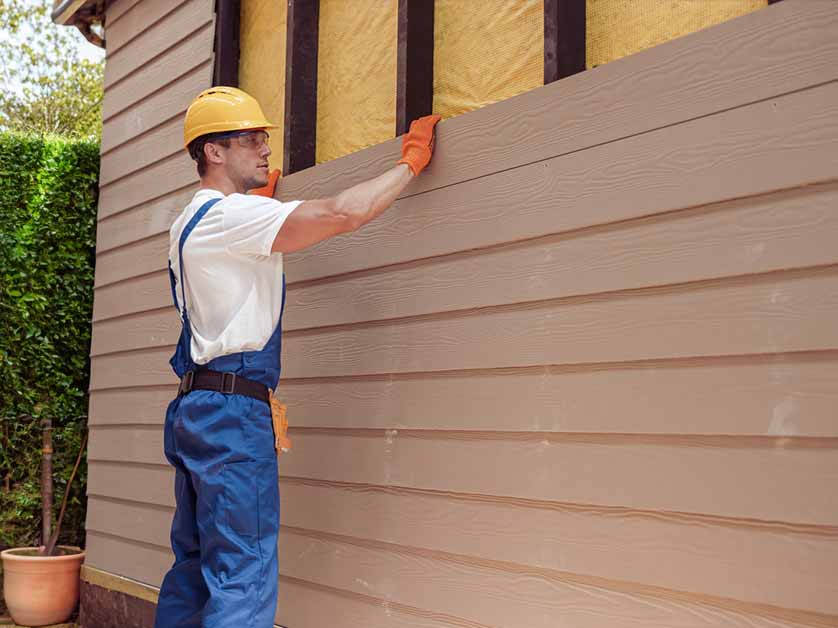Affordable and Professional Morris Siding Contractor for Every Project
Wiki Article
The Necessary Guide to the Different Types of Home Siding and Their Special Benefits
In the realm of home improvement, selecting the right siding is a crucial decision that impacts both aesthetic appeal and useful efficiency. With so several alternatives to consider, which exterior siding material absolutely stands out for your details task?Timber Home Siding
Timber home siding, a prominent choice for residential outsides, uses a classic aesthetic that combines natural beauty with architectural stability. This home siding material is available in different styles, consisting of clapboard, roof shingles, and board-and-batten, allowing homeowners to tailor their appearance to match their design choices. Wood siding is typically crafted from sturdy types such as cedar, redwood, or pine, which are recognized for their durability and ability to stand up to environmental stress factors.One of the key benefits of timber exterior siding is its excellent insulation residential or commercial properties, which can add to energy performance and lower home heating costs. In addition, wood home siding is biodegradable, making it an eco friendly alternative when sourced sustainably. Regular maintenance, consisting of painting or discoloration, can lengthen its life expectancy and boost its appearance, enabling homeowners to protect the natural appeal of the timber.
However, possible drawbacks include sensitivity to insects, rot, and climate damages, necessitating appropriate therapy and upkeep - morris siding contractor. In spite of these worries, when properly taken care of, timber house siding can offer a attractive and durable solution that enhances the character of a home while using a cozy, welcoming atmosphere

Vinyl Siding
Plastic home siding has become a leading option for house owners seeking a low-maintenance outside choice that incorporates durability and price. This flexible material is crafted from polyvinyl chloride (PVC), making it immune to different weather condition conditions, including wetness and UV rays. Consequently, vinyl house siding does not warp, rot, or fade, making sure resilient visual allure.Among the primary advantages of vinyl home siding is its extensive variety of designs and colors, enabling home owners to accomplish the wanted try to find their building without the need for regular repainting. In addition, vinyl exterior siding is simple to mount, which can considerably minimize labor prices during construction or restoration tasks.
Vinyl exterior siding additionally adds to energy efficiency. Lots of choices attribute insulation support, which enhances thermal performance, helping to preserve comfy interior temperature levels and potentially reducing energy expenses. Furthermore, its smooth surface helps with simple cleansing, needing just routine cleaning with a yard hose to remove dirt and debris.
Fiber Cement Home Siding
Fiber cement home siding has gotten grip among home builders and house owners alike because of its impressive mix of longevity and visual adaptability. Composed of a mix of sand, cement, and cellulose fibers, this exterior siding choice is engineered to endure extreme weather, consisting of high winds, heavy rain, and temperature variations, making it a durable option for residential outsides.
One of the key benefits of fiber concrete siding is its resistance to parasites, such as termites, and its non-combustible nature, offering enhanced fire safety and security. morris siding contractor. Additionally, it is readily available in a vast selection of styles, shades, and appearances, allowing property owners to accomplish their wanted aesthetic without giving up performance
One more advantage is its low upkeep needs; fiber concrete home siding usually needs paint or staining every 5-10 years, which is less frequent than various other products. Its longevity adds to a reduced overall cost of ownership, as it decreases the requirement for constant fixings or substitutes.
Eventually, fiber concrete siding stands for an outstanding investment for those looking for a durable, appealing, and flexible exterior option, incorporating both kind and function to enhance the home's aesthetic allure.
Steel Exterior Siding
The allure of steel house siding depends on its durable toughness and modern visual charm, making it a favored selection for contemporary architecture. Available in products such as light weight aluminum and steel, steel house siding supplies a variety of surfaces and colors, enabling house owners to attain a tailored appearance that enhances their style vision.
Energy effectiveness is another considerable benefit, as lots of metal siding products are created with insulation options that aid regulate indoor temperatures. This can cause lowered power expenses gradually. In addition, steel siding is frequently recyclable, making it an environmentally pleasant selection for sustainability-minded house owners.
The installment procedure for steel siding can be fairly simple, causing a quicker turnaround time for building and construction tasks. Generally, metal exterior siding combines performance and design, making it a functional choice for those seeking a visually enticing and enduring outside finish.
Block and Rock Siding
Block and stone siding stands apart as a timeless option that improves the visual beauty of any home. Recognized for their durability and low maintenance, these products provide an exceptional return on financial investment while boosting the property's aesthetic allure. Readily available in different shades, textures, and patterns, block and stone can be customized to suit varied architectural designs, from traditional to contemporary.Among the main advantages of brick and stone house siding is their power effectiveness. Both products have all-natural protecting residential or commercial properties that assist control interior temperatures, possibly reducing home heating and air conditioning expenses. Furthermore, they provide exceptional fire resistance contrasted to various other exterior siding alternatives, adding to improved security.
One more advantage is their long life. Block and rock can last for years, often requiring marginal upkeep beyond periodic cleaning. Unlike timber home siding, they are impervious to parasites and rot, ensuring a lasting exterior that holds up against the components.
Conclusion
In recap, the selection of house siding substantially affects a home's visual charm, energy Home Page performance, and maintenance needs. Each kind of siding-- whether timber, vinyl, fiber concrete, metal, or wikipedia reference block and rock-- provides one-of-a-kind advantages customized to numerous house owner choices and environmental problems.One of the key advantages of timber home siding is its excellent insulation residential properties, which can contribute to energy effectiveness and lower heating costs. Additionally, wood house siding is naturally degradable, making it an environmentally friendly alternative when sourced sustainably.One of the primary benefits of metal exterior siding is its resistance to numerous environmental elements.Energy performance is another substantial benefit, as lots of steel siding products are made with insulation choices that aid control indoor temperature levels. Each type of home siding-- whether timber, plastic, fiber concrete, brick, or steel and stone-- provides unique benefits tailored to various property owner preferences and environmental conditions.
Report this wiki page